Key takeaways:
- Indie film workshops foster a supportive community that enhances emotional well-being, creative growth, and the development of unique artistic voices.
- Participants gain invaluable practical knowledge, networking opportunities, and the courage to take risks, leading to collaboration and lasting friendships.
- Insights from experienced filmmakers emphasize the power of storytelling through collaboration, resilience in the face of feedback, and the importance of maintaining curiosity in the creative process.
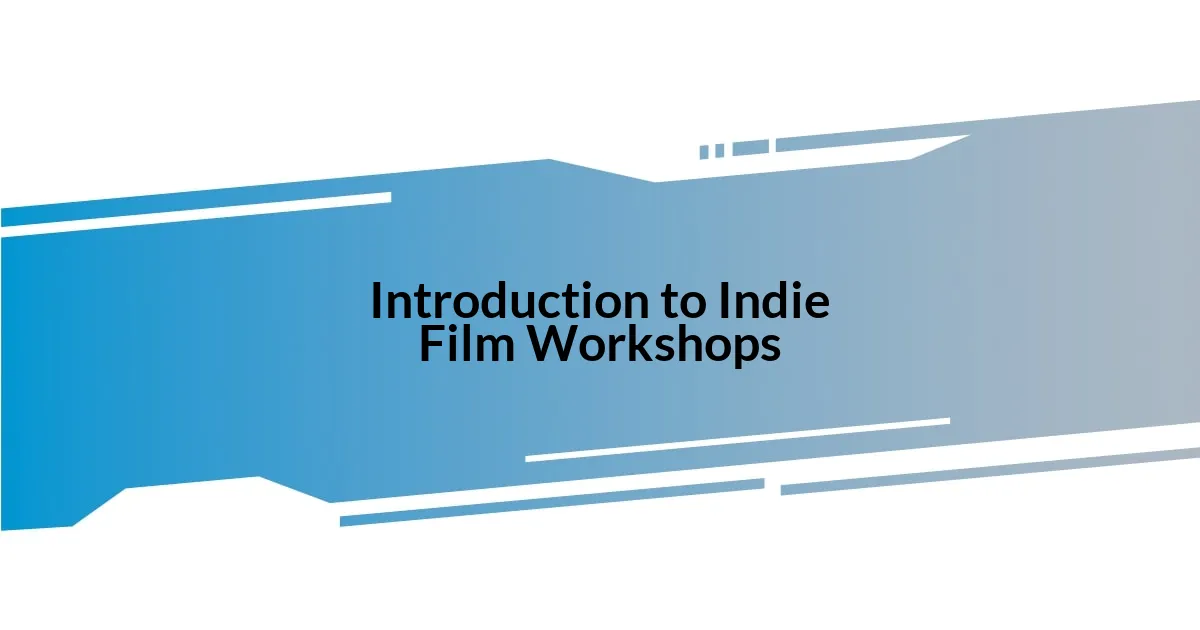
Introduction to Indie Film Workshops
Indie film workshops can be a transformative experience for creatives, and I remember my first workshop vividly. It felt like stepping into a small universe where ideas collided, and passion fueled everything around me. The sense of camaraderie was palpable—what a stark contrast to the solitary grind of writing or filming alone!
These workshops often provide practical knowledge, but I found the emotional support equally valuable. It’s incredible how sharing your vision with like-minded individuals can ignite your inspiration; I often left sessions buzzing with new ideas. Have you ever felt that electric rush when a mentor shares what you thought was just a fleeting thought? I certainly have, and it’s a thrill that keeps me diving deeper into the indie film scene.
In my experience, indie film workshops are more than just learning opportunities—they’re spaces to connect, grow, and discover your unique voice. Each session felt like unearthing new facets of myself as a filmmaker. What if, by attending one, you could find the missing piece for your own story? That’s the beauty of it; the potential for discovery is endless.
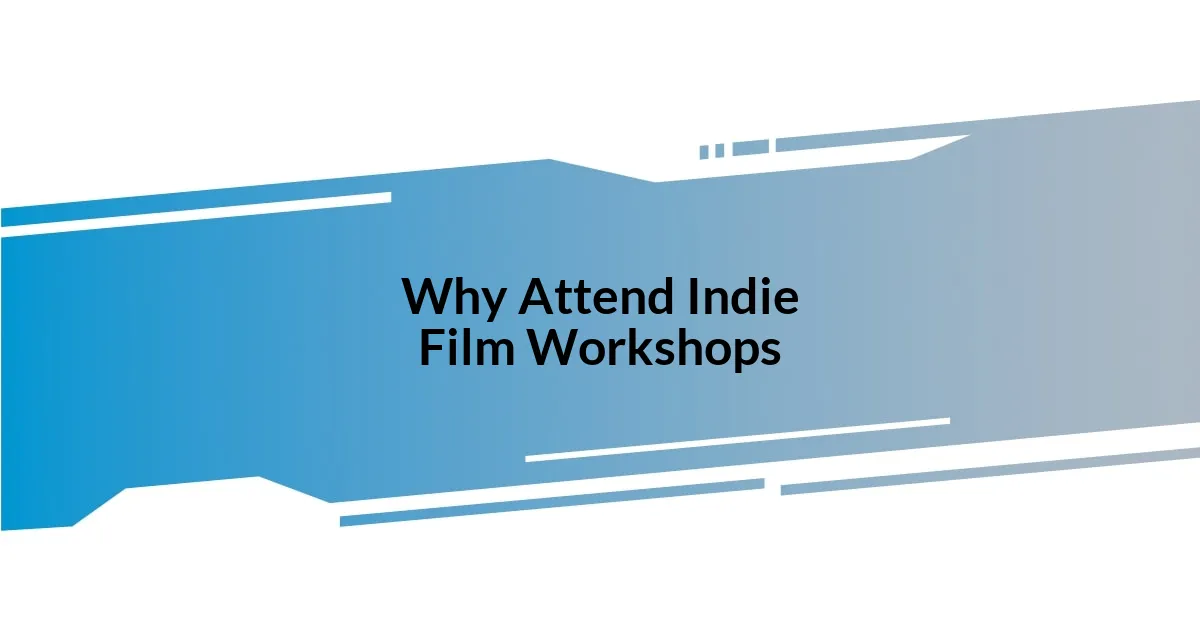
Why Attend Indie Film Workshops
Attending indie film workshops offers a unique chance to learn directly from industry professionals. I vividly recall a session led by an accomplished director who dissected our short films frame by frame. The immediate feedback was invaluable; it felt as if each comment was tailored for me, illuminating aspects I hadn’t even considered before. This powerful exchange of ideas reignited my creative drive and gave me clear steps to elevate my work.
Another significant advantage of participating in these workshops is the opportunity to network with fellow filmmakers. I remember striking up conversations over warm coffee during breaks and realizing how many stories were shared in that space. Those organic connections often lead to collaborative projects, and sometimes, friendships that endure beyond the workshop. Have you ever bonded over a common struggle in your craft? It’s a reminder that we’re not alone in this journey, and the support from peers can be a game-changer.
Finally, indie film workshops cultivate a nurturing environment that embraces risk-taking. I stepped out of my comfort zone during an impromptu pitch session, sharing a concept I thought might be too ambitious. The encouragement I received was overwhelming, pushing me to develop that idea further. The sense of community transformed my fear of failure into a platform for growth. Isn’t it refreshing to be in a place where experimentation is celebrated? That atmosphere can truly change your perspective on creativity.
| Key Benefit | My Personal Insight |
|---|---|
| Practical Knowledge | Receiving direct feedback from experienced professionals has refined my craft significantly. |
| Networking Opportunities | Building relationships with fellow filmmakers has led to inspiring collaborations and lasting friendships. |
| Encouraging Environment | Stepping out of my comfort zone was easier in a supportive space, fueling my creativity and growth. |
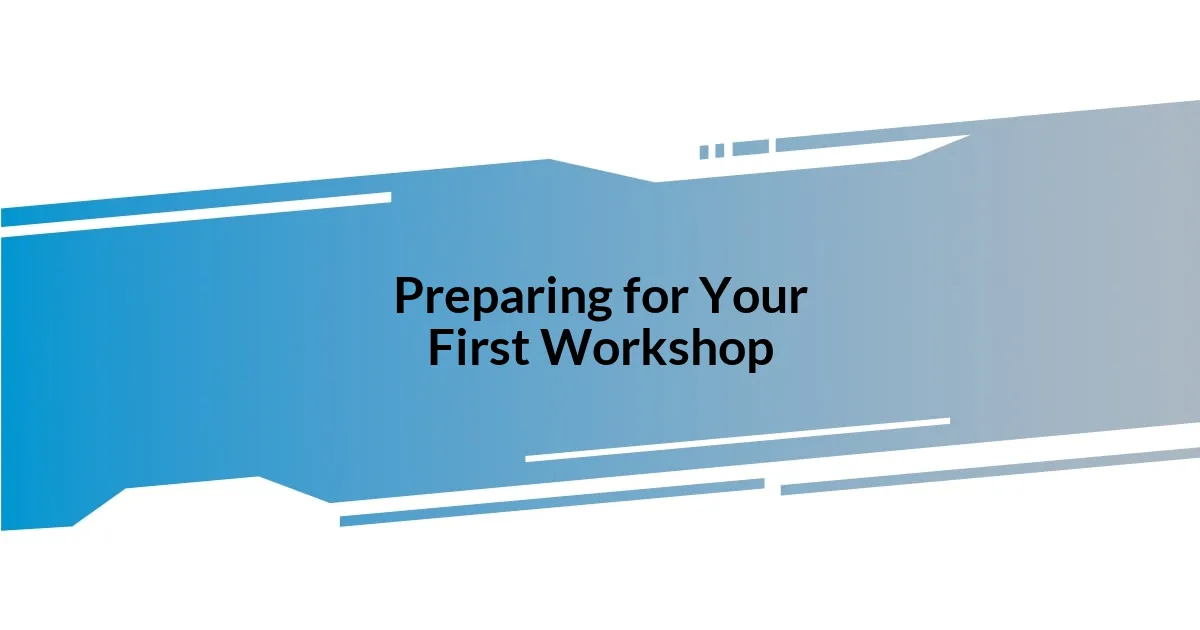
Preparing for Your First Workshop
Preparing for your first indie film workshop is both exciting and a bit nerve-wracking. From choosing the right workshop to mentally gearing up for the experience, there’s a lot to consider. I remember packing my notes, scripts, and even my favorite pens as if I was preparing for a big exam. That anticipation mixed with a hint of anxiety really set the stage for my learning adventure.
To help you prepare, here are a few key tips that I found invaluable:
- Research the Workshop: Look into the facilitators, their background, and what topics will be covered. Familiarity can ease some nerves.
- Bring Your Work: Don’t hesitate to bring samples of your projects. Sharing your work can lead to fruitful discussions and personal insights.
- Stay Open-Minded: Every workshop is different, and the people you meet may challenge your perspectives. Embrace this!
- Network Actively: Use breaks to connect with others. I had a shared moment with a stranger over our love for obscure films, which led to a collaboration later.
- Prepare Questions: Think of questions beforehand that can spark deeper discussions. This not only benefits you but also enriches the experience for others.
Feeling a mix of excitement and apprehension is normal, and I found that channeling that energy into preparation made my first workshop truly memorable. Setting intentions and being proactive can transform your experience dramatically. Just remember, this is your chance to learn and connect in a vibrant community!
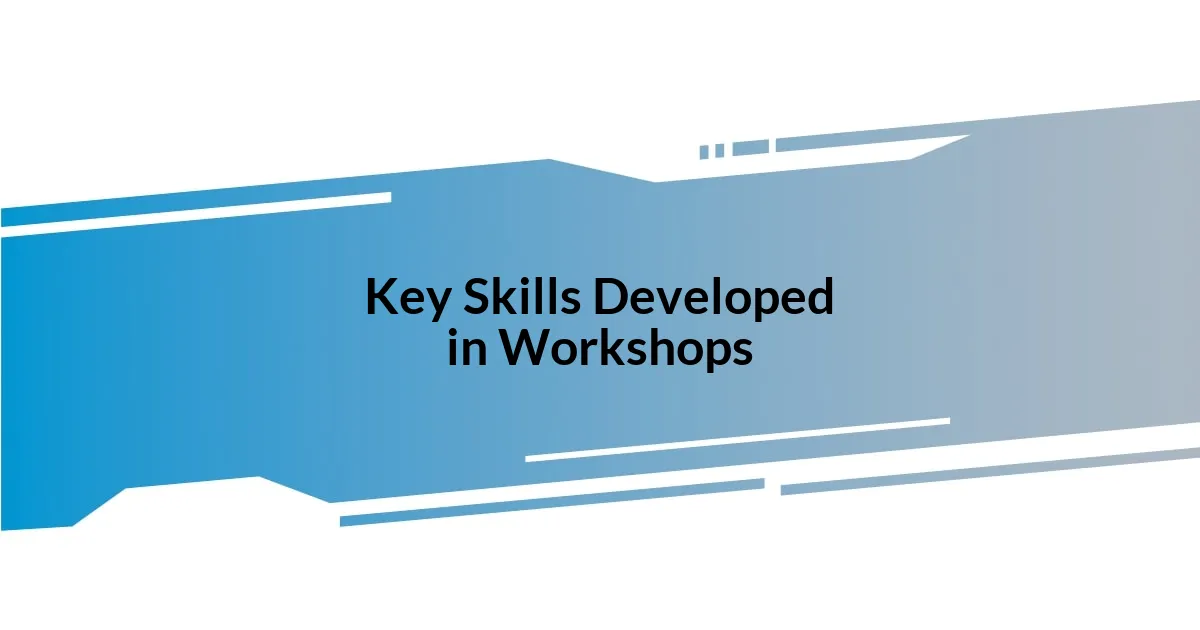
Key Skills Developed in Workshops
Workshops have a remarkable way of honing practical skills that are essential for any filmmaker. I remember the first time I lay in a room full of eager participants, brainstorming on a script together. The camaraderie pushed me to verbalize my ideas, which not only sharpened my storytelling abilities but also helped me to articulate my thoughts clearly. Isn’t it fascinating how sharing our creative visions with others can lead to direct improvements in our communication skills?
Another key skill that developed for me was adaptability. During one intense session, we were thrown into a last-minute editing challenge. With no prior warning, I had to adapt swiftly, embracing the chaos while collaborating with others. I left that workshop feeling more resourceful and confident in tackling unexpected hurdles in my projects. Have you ever noticed how sometimes the most challenging experiences can turn out to be the greatest teachers?
Lastly, workshops teach the invaluable art of constructive critique. I vividly recall giving feedback to a peer whose film evoked such raw emotion. Engaging in respectful, honest discussion helped me to refine my analytical skills. This isn’t just about delivering criticism; it’s about fostering a dialogue that inspires growth. Isn’t it amazing how, through critique, we can create environments that not only uplift others but also help us evolve as artists?
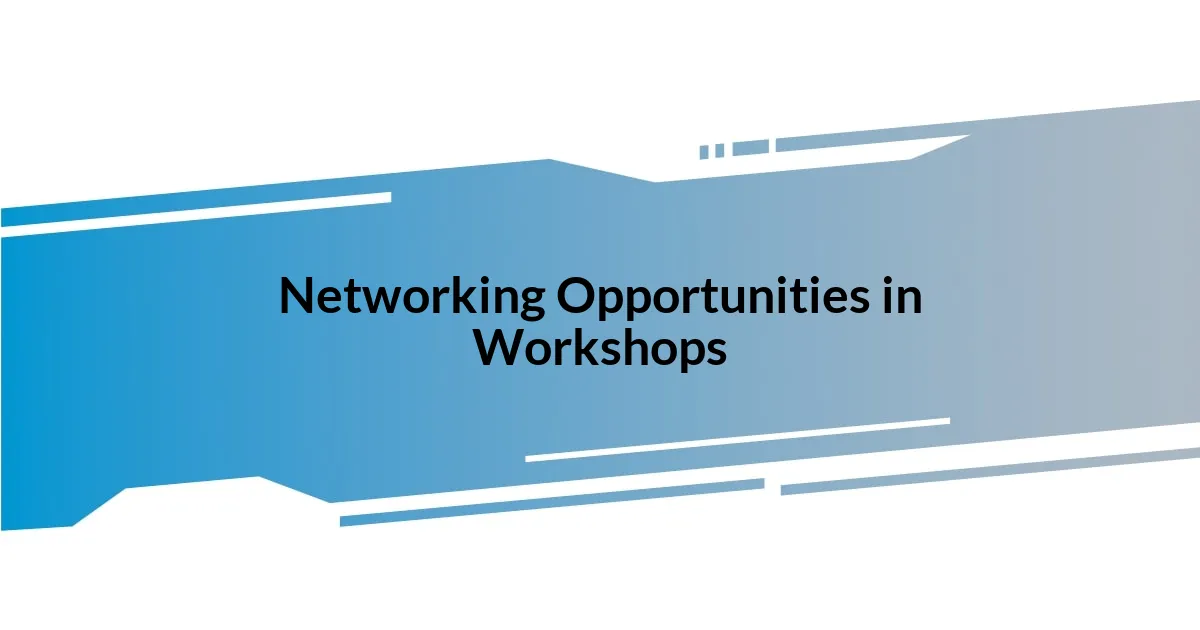
Networking Opportunities in Workshops
One of the most rewarding aspects of indie film workshops is the networking potential they offer. I vividly recall striking up a conversation during a coffee break with a filmmaker whose work resonated with my own style. We exchanged contact details, and that small chat sparked a collaboration that would have never happened otherwise. Have you ever realized how a single moment can transform your creative journey?
Throughout my workshop experiences, I’ve learned that the connections formed aren’t just about exchanging social media handles; they often evolve into genuine friendships. In one particular workshop, I bonded with a group of participants over our shared frustrations in navigating the film industry. This led us to create a support group that met regularly, discussing projects and sharing resources. Isn’t it wonderful when a shared struggle transforms into a supportive community?
Additionally, I’ve observed that these workshops attract a diverse range of talent, from aspiring directors to experienced cinematographers. I remember feeling intimidated at first, but then I embraced that fear and approached a seasoned editor who inspired me. Our conversation about the nuances of film pacing opened my eyes to new techniques I hadn’t considered before. Breaking the ice with industry veterans not only boosted my confidence but also enriched my learning experience exponentially. Don’t underestimate the value of stepping out of your comfort zone!
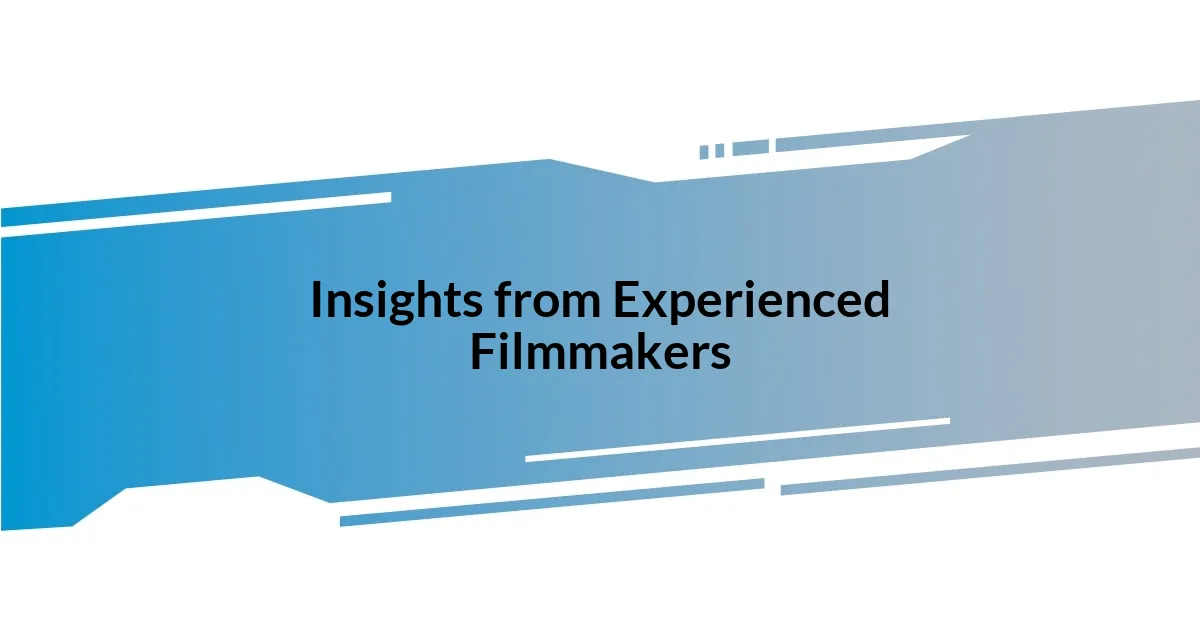
Insights from Experienced Filmmakers
I often find that seasoned filmmakers share a common sentiment: the power of storytelling can be enhanced tremendously through collaboration. A mentor once told me during a workshop that each person’s voice contributes a unique layer to the narrative tapestry. I still remember how his passionate explanation inspired me to embrace collaboration, thinking, “Why not harness different perspectives to enrich my own ideas?” It made me appreciate the collective creativity and how it can elevate a project beyond what a solitary vision might achieve.
Emotionally, one of the most significant insights I’ve gained from experienced filmmakers is the importance of resilience. During a particularly challenging workshop, we were critiqued not just on our projects but also on our ability to take the feedback in stride. One participant shared a heart-wrenching story of how rejection had previously derailed her career but ultimately fueled her drive to create. Her honesty sparked a realization for me: acceptance of failure as a stepping stone, rather than a stumbling block, can lead to breakthroughs. Have you ever found that your setbacks were, in fact, setups for something greater?
Lastly, I’ve noticed that many accomplished filmmakers stress the importance of maintaining a genuine curiosity throughout one’s career. A panelist at one workshop passionately spoke about how curiosity allowed him to explore unconventional ideas. I remember how his infectious enthusiasm encouraged me to ask more questions, igniting my desire to learn from every experience. Isn’t it refreshing to see that curiosity isn’t just for amateurs, but a vital component of staying innovative in a constantly evolving industry?
